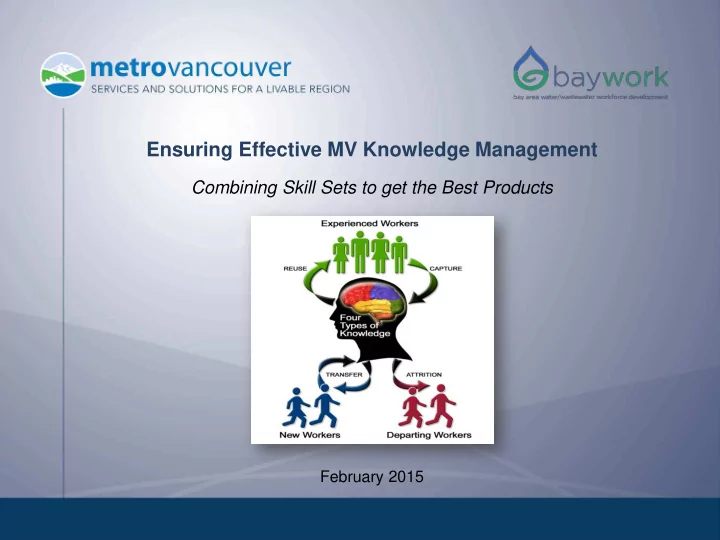

Ensuring Effective MV Knowledge Management Combining Skill Sets to get the Best Products February 2015
Outline Program context Deliverables demonstration Success & Challenges Q&A 2
What is Utility Specific Knowledge? Technical knowledge documented in design reports and drawings – much of this has not been kept up-to- date or was never documented Knowledge of MV systems and equipment that staff have ‘in their heads’ Knowledge transfer traditionally done verbally by experienced staff while supervising the work Learn as you go Learn as it breaks “Ask Fred” 3
MV Retirement Statistics Department Potential Retirements over Total next 9 yrs (2015-2023) Age 62 Factor 90 (%) (%) Liquid Waste Services [545] 23% 17% 40% Water Services [381] 18% 18% 36% ~ 38% of utilities staff are eligible to retire in the next 9 years. Factor 90: Full pension when age + years of service = 90 Age 62: Average retirement at MV 4
Minimizing the Impact of this Loss All O&M divisions recognized the impact of the dependence on knowledge in people's heads and inconsistent and incomplete learn-as-you go training Recognition of the linkage with effective safety management programs, performance management and asset management The formal training and procedures development projects in water treatment have shown to be a proven model for capturing and transferring this knowledge and it was agreed to move forward with this approach 5
MV Technical Knowledge MV Specific Business Industry Specific (AWWA, WEF, EOCP) Safety Technical University/College High School 6
TAP in Brief The Technical Training and Procedures (TTAP) Program is a multi-year technical knowledge management program which started in 2013. This program is a key element of succession planning and is strongly linked to safety programs as well as performance management. Key aspect of the program is to put the work processes and resources in place to ensure ongoing access, support and maintenance of the deliverables 7
Consulting Services Developing this type of program relies heavily on experienced MV staff resources To optimize involvement of MV staff we needed to partner with a technical training consultant on multi-year contract(s). Partnership provides: Complementary utility process knowledge Adult learning and instructional design expertise Consistency in content development Learning management system programming Facilitation, writing and editing resources Graphics development expertise 8
Program Valuation “Best practice indicates that complete operator training and documentation for a water or wastewater facility may be .25% to .75% of the total project capital cost” Gerry Stevens (AECOM), BCWWA 2007 The actual spending ratio at SCFP was 0.33 %; approximately $1M for a facility with a capital construction cost of $300 million. Estimated value of MV water and liquid waste infrastructure (does not include WWTPs): “The current replacement value of the GVWD assets is estimated at $2.4 B and the GVS&DD assets is estimated at $3.1 B .” Asset Register Memo from Matthew Walker to A.Van Roodselaar, Aug. 23, 2013 10
MV’s Blended Approach Procedures Troubleshooting (Operations, Maintenance, Guides Lockout, CSE) Performance Assessment Scenario Training Skills Assessment Field Training Knowledge Assessment E-Learning Competency Matrix Resources: equipment lists, drawings, process narratives,SMEs, MTAs etc. 12
Project Planning and Implementation Phase 1: Assessment Equipment verification Task analysis Maintenance task analyses Competency mapping Gap analysis Curriculum development Prioritization Development plan and schedule Phase 2: Development & Delivery Procedure development E-learning development Field guides Scenario training Troubleshooting guides Phase 3: Continuous Improvement Ongoing support model 13
Project Communication
Maintenance Task Analyses (MTA) MTAs are needed to move toward reliability centered maintenance. Process involves: identifying the criticality of each piece of equipment reviewing possible failure modes developing the appropriate maintenance strategy COQ UV MTA Sapperton PS MTA 14
Procedures Maintenance Procedures IIWWTP – Bar Screen Overhaul Operations Procedures CRWPS Isolate and Remove a Pump From Service 15
Field & Review Guides Field Guide AIWWTP FE Disinfection System Review Guides AIWWTP FE Disinfection System 16
Recommend
More recommend